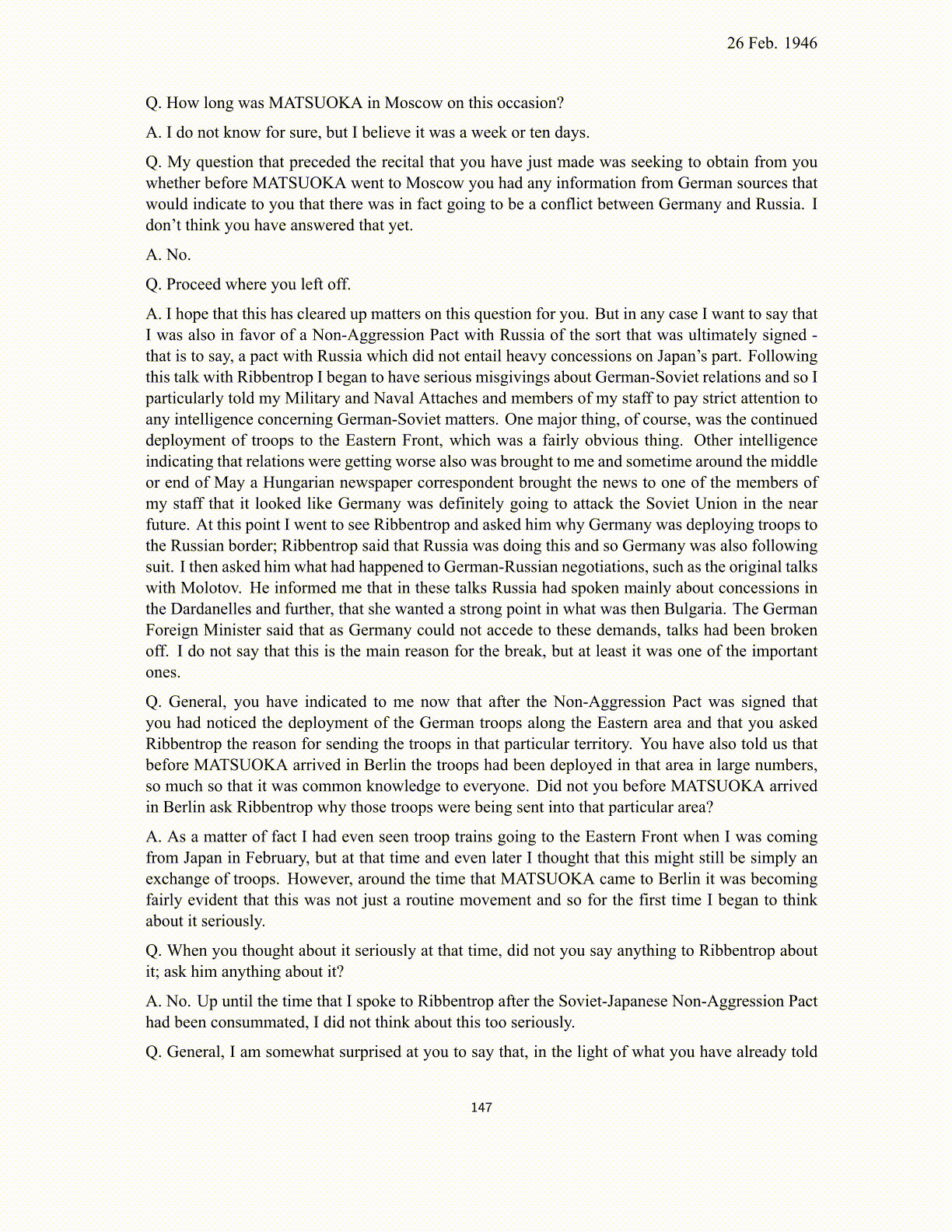
26 Feb. 1946 Q. How long was MATSUOKA in Moscow on this occasion? A. I do not know for sure, but I believe it was a week or ten days. Q. My question that preceded the recital that you have just made was seeking to obtain from you whether before MATSUOKA went to Moscow you had any information from German sources that would indicate to you that there was in fact going to be a conflict between Germany and Russia. I don’t think you have answered that yet. A. No. Q. Proceed where you left off. A. I hope that this has cleared up matters on this question for you. But in any case I want to say that I was also in favor of a Non-Aggression Pact with Russia of the sort that was ultimately signed - that is to say, a pact with Russia which did not entail heavy concessions on Japan’s part. Following this talk with Ribbentrop I began to have serious misgivings about German-Soviet relations and so I particularly told my Military and Naval Attaches and members of my staff to pay strict attention to any intelligence concerning German-Soviet matters. One major thing, of course, was the continued deployment of troops to the Eastern Front, which was a fairly obvious thing. Other intelligence indicating that relations were getting worse also was brought to me and sometime around the middle or end of May a Hungarian newspaper correspondent brought the news to one of the members of my staff that it looked like Germany was definitely going to attack the Soviet Union in the near future. At this point I went to see Ribbentrop and asked him why Germany was deploying troops to the Russian border; Ribbentrop said that Russia was doing this and so Germany was also following suit. I then asked him what had happened to German-Russian negotiations, such as the original talks with Molotov. He informed me that in these talks Russia had spoken mainly about concessions in the Dardanelles and further, that she wanted a strong point in what was then Bulgaria. The German Foreign Minister said that as Germany could not accede to these demands, talks had been broken off. I do not say that this is the main reason for the break, but at least it was one of the important ones. Q. General, you have indicated to me now that after the Non-Aggression Pact was signed that you had noticed the deployment of the German troops along the Eastern area and that you asked Ribbentrop the reason for sending the troops in that particular territory. You have also told us that before MATSUOKA arrived in Berlin the troops had been deployed in that area in large numbers, so much so that it was common knowledge to everyone. Did not you before MATSUOKA arrived in Berlin ask Ribbentrop why those troops were being sent into that particular area? A. As a matter of fact I had even seen troop trains going to the Eastern Front when I was coming from Japan in February, but at that time and even later I thought that this might still be simply an exchange of troops. However, around the time that MATSUOKA came to Berlin it was becoming fairly evident that this was not just a routine movement and so for the first time I began to think about it seriously. Q. When you thought about it seriously at that time, did not you say anything to Ribbentrop about it; ask him anything about it? A. No. Up until the time that I spoke to Ribbentrop after the Soviet-Japanese Non-Aggression Pact had been consummated, I did not think about this too seriously. Q. General, I am somewhat surprised at you to say that, in the light of what you have already told 147